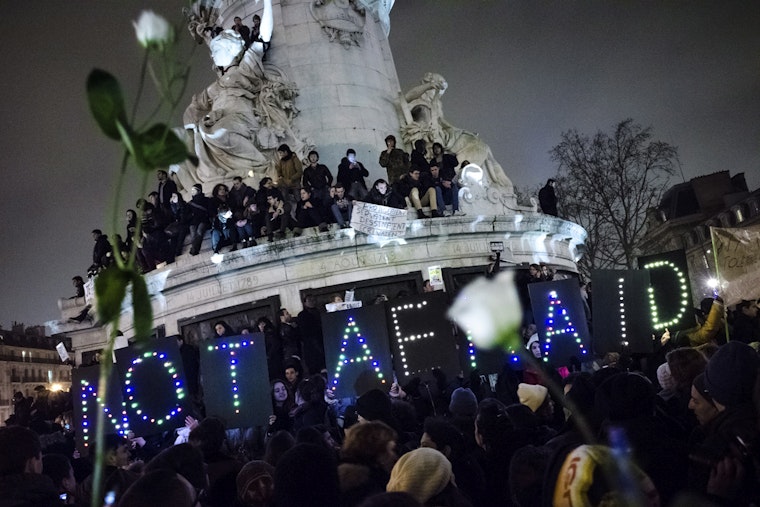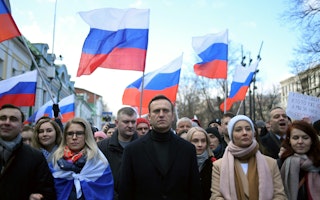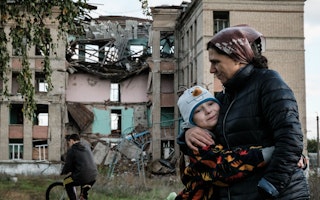Inside a Paris Newsroom After the Charlie Hebdo Attacks
By Eleanor Kelly

Yesterday, a brazen terror attack left 12 dead in and around the offices of Charlie Hebdo, a weekly satirical newspaper in Paris. According to Johan Weisz-Myara, publisher of the online news magazine StreetPress, the alleged attackers then hijacked a car not 100 meters from his newsroom. Here, Weisz-Myara talks about the incident, the aftermath, and the media’s responsibility during news events like this one.
How did events unfold in and around your office yesterday?
We heard the news on our social networks first. Then we started getting text messages. A few minutes later the terrorists hijacked a car on our block to get out of Paris. The first thing we did as journalists was go to the place it happened and start asking questions—neighbors and people like that.
Once we got back to the newsroom we asked ourselves, what should we do? After the anger, the hot news, what is our responsibility as the media? Because when you have a terrorist attack, you have the attack itself, and then you have something bigger, which is the psychological impact and the impact in the media.
What’s the security situation at your office right now?
Our newsroom is 30 meters from a synagogue, and there are two policemen in front of that, but they’re there for the synagogue, not us. At bigger newspapers you have policemen out front.
How has the incident affected your operations as a media outlet?
I think we feel accountable with everything we write and everything we post on social networks. Right now it all has such an impact. And even if you can’t hear it in my voice because I’m very tired, we’ve really tried to keep smiling and act, in a certain way, as if nothing happened. Because the terrorists’ goal is to turn communities against one another, and make people angry and paranoid.
Have the attacks affected your editorial decisions?
We wrote an op-ed entitled “Pourquoi l’attentat nous rend (déjà) cons” (How the Terror Attacks Have Already Made Us Crazy). In it, we explain that we had to change some stories we had planned to publish.
Such as?
For instance, today we had planned to publish an article about a French imam who is very present in the media and criticized by many people in the Muslim community. Obviously if we published it today it would mean something more than what we wanted. It would be over-interpreted. So that will be published next week instead.
Are you concerned that this incident will have a chilling effect on the French media’s reporting in general?
I don’t think the French media will be frightened to publish caricatures of any kind because we have a deep culture of freedom of expression. I feel the real trap is the way the media will speak about different communities.
Are you already seeing the media begin to lash out at certain communities?
Most of the media are working in an accountable way, but for instance, in an editorial about the attacks in [the daily newspaper] Le Figaro, the title is “Guerre,” which means “War.” And when you start calling it war, I think you fall into that trap, because the terrorists want it to be war. The title “War” is very frightening to me.
Can you give us some context around the French media? Is it very polarized like in the United States?
No, it’s definitely not like in the U.S. I don’t think that the left-wing/right-wing opposition is really relevant for yesterday’s terror attack.
Do you think the attacks will have a long-term effect on attitudes toward Islam in France?
It would be naïve to say there won’t be a before and an after. But it’s also not obvious that things will be worse. Maybe it’s going to be better. Maybe we will have an evolution and the terrorists will lose. Maybe they killed 12 people, and now French society will be clever and understand that the best answer is to unite and not to divide.
We’ll see how it’s going to work. It’s not compulsory that the attack will make things worse. That’s the goal of the terrorists, but maybe we are stronger than them. I think we are.
StreetPress is a French-language publication that covers marginalized communities in France and is a grantee of the Open Society Foundations.
Until May 2021, Eleanor Kelly was the regional head of communications for the Open Society Foundations.


